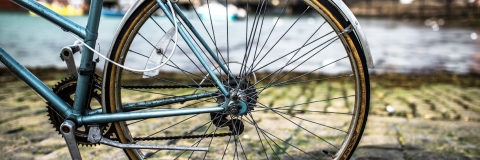
Sidebar navigation

Getting around by foot or by bike
A cheap, easy and quick way to get around our flat city
Portsmouth is a flat city, and most areas you'll live are within a short distance of the town centre and campus — so the best way to discover the city is on foot or by bike.
Walking and cycling local journeys is a great way to get more active, which can boost your physical and mental health and has even been linked to better academic performance.
Planning your route
You can find plenty of footpaths and cycleways to follow across the city:
- To find University buildings, halls of residence, city buildings, bike parking, print stations, food and drink services, student services or sports facilities, check our campus map
- For a smartphone-friendly walking map, and an app to estimate how long your journey takes, plan your journey using My Journey Hampshire or Breeze travel apps
- And it you’re looking for quieter routes to get across the city while avoiding traffic, use the Portsmouth City Council walking and cycling map
Our campus map
My Journey Hampshire
Breeze
Portsmouth City Council walking and cycling map
Cycle safety
- Make sure your bike is fitted with front and back lights, especially when the nights get darker - it is the law
- Wear a helmet
- Wear hi-vis clothing such as a vest
- Use the middle of the most appropriate lane on roundabouts and arrive at junctions in the middle of the lane
- Look out for other vehicles coming from side roads
- Wait in the traffic queue, unless it’s safe to move to the front
- Cycle on the left hand side of the road, and one metre from the kerb - not in the gutter
- Keep at least a door's width away from parked cars
- Don't cut through on the inside of lorries or buses – they won't be able to see you
- Remember that in wet weather you're harder to see, stopping takes longer and surfaces are slippery
- Only cycle on the pavement when there is a sign which says you can use the pavement - use your bell or call out politely if needed
If you're a complete beginner and you need more advice to build your confidence before cycling in traffic, visit Cycling UK's website.
Locking up your bike
Like many cities, bike theft does sometimes happen — but you can take some simple steps to keep your bike safe:
- Use an older bike as newer bikes are more valuable are more likely to be stolen
- Always secure the frame and both wheels of your bike with two good D-locks
- Lock your bike to an immovable object, ideally a proper bike stand and check your bike can't slip down and be damaged
- Take your valuables with you
You can get your bike marked and registered to the National Cycle Database at our free bicycle events throughout the year:
If your bicycle is stolen on campus, report it to Halls reception or Security, who will assist you in obtaining a police crime number so you can make an insurance claim.
Bike storage
On campus
There are over 1,500 cycle hoops and two-tier cycle racks across campus to help you lock your bike securely, and the University has a number of secure, covered cycle cages with swipe card access at these locations:
- Burnaby Terrace Car Park
- Eldon Building (Middle Street)
- Harry Law Hall
- Mercantile House
To gain access to the above cycle cages, email campus.security@port.ac.uk to request access via your student card, quoting your student ID card number, and your name.
On-street bike storage
It can be difficult to store bikes securely in private rented accommodation. As a result, some roads in Portsmouth have on-street bike storage facilities called Bike Hangars, provided by Portsmouth City Council. If your road has one of these, you can apply to use them. You can also nominate your road for a new hangar, if you don't live near one.
E-bikes and e-scooters
Voi provides rental e-bikes in Portsmouth from as little as 18p a minute, with docking bays located all around Southsea.
E-scooters cannot be used:
- on pavements
- on University land such as Ravelin Park and University building courtyards
- in University buildings, including bringing e-scooters inside halls of residence or educational buildings for storage
They're allowed in the same places that bicycles are - on the road, in bike lanes and in some shared spaces. You should be careful and respectful around other road users, especially pedestrians, as they may not be able to see or hear you coming.
If you want to use an e-scooter to get about the city, you must use one from the official rental scheme, as private e-scooters are illegal in public places.
Scooter safety
Anyone can report misuse of publicly-rented e-scooters, including dangerous riding and bad parking, directly to the operator VOI using their reporting form. Staff and students can also report any accidents or incidents on campus to the University's health and safety team. For more information:
University policy on e-scooters Government guidance on e-scooters
Looking for our London campus?
More information on cycling and our London campus can be found below.

